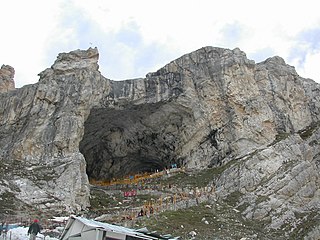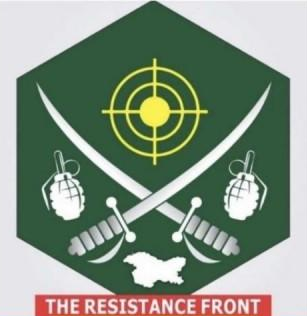
The insurgency in Jammu and Kashmir, also known as the Kashmir insurgency, is an ongoing separatist militant insurgency against the Indian administration in Jammu and Kashmir, a territory constituting the southwestern portion of the larger geographical region of Kashmir, which has been the subject of a territorial dispute between India and Pakistan since 1947.

Uri is a town and a tehsil in the Baramulla district, in the Indian union territory of Jammu and Kashmir. Uri is located on the left bank of the Jhelum River, about 10 kilometres (6.2 mi) east of the Line of Control with Pakistan.

Al-Badr is an Islamist militant group operating in the Kashmir region. The group was allegedly formed by the Pakistani Inter-Services Intelligence (ISI) in June 1998. It is believed the group was encouraged by the ISI to operate independently from their previous umbrella group, Hizb-ul-Mujahideen (HM). Prior to the group's separation from HM, they participated in the fighting in Afghanistan in 1990 as part of Gulbuddin Hekmatyar's Hizb-l-Islami (HIG) alongside other anti-Soviet Afghan mujihadeen. India and the United States have declared it a terrorist organisation and banned it. Pakistan has long been a difficult and disruptive neighbor of Afghanistan, increasing Afghanistan's instability by providing intelligence, weapons and security to the Afghan Taliban and the Haqqani network. But now Pakistan is facing strong backlash both domestically and internationally against its policy of militant sponsorship.

The 2000 Amarnath pilgrimage attack on 1 and 2 August was the massacre of between 89 to 105 people, with 62 others injured in at least five different coordinated attacks by Islamist militants in Anantnag district and Doda district of Indian administered Kashmir.
Human rights abuses in Jammu and Kashmir range from mass killings, enforced disappearances, torture, rape and sexual abuse to political repression and suppression of freedom of speech. The Indian Army, Central Reserve Police Force (CRPF), and Border Security Personnel (BSF) have been accused of committing severe human rights abuses against Kashmiri civilians. According to Seema Kazi, militant groups have also been held responsible for similar crimes, but the vast majority of abuses have been perpetrated by the armed forces of the Indian government.
On 5 December 2014, there were four different terror attacks at multiple places in the Kashmir Valley of the state of Jammu and Kashmir in India.

The 2016–2018 India–Pakistan border skirmishes were a series of armed clashes between India and Pakistan, mostly consisting of heavy exchanges of gunfire between Indian and Pakistani forces across the de facto border, known as the Line of Control (LoC), between the two states in the disputed region of Kashmir. The skirmishes began after India claimed to have conducted surgical strikes against militant launch pads within the Pakistani-administered territory of Azad Jammu and Kashmir on 29 September 2016.
On the midnight of the second and third of October 2016, militants attacked a camp of the Indian Army's 46 Rashtriya Rifles in the Baramulla district of Jammu and Kashmir, India.
There have been several attacks on Indian Armed Forces by militants in 2016.
The Indian Army base in Nagrota, in Jammu and Kashmir was attacked on 29 November 2016 by a group of militants.

Stone pelting in Kashmir refers to stone throwing by Kashmiris on the Indian forces and Jammu and Kashmir Police deployed for crowd control in Jammu and Kashmir to support the separatists, insurgents. In the local language, it is termed as "Kanni Jung", which means fighting with stones and the stone pelters are called as Sangbaaz or Pathraw Player. However, in the recent past the number of stone pelting has dropped significantly.
On 10 July 2017, the first Monday of the month of Shraavana, 8 Hindu civilian pilgrims on the way from Amarnath Temple in Kashmir Valley, in the Indian state of Jammu and Kashmir, were killed in an Islamist terror attack. The pilgrims mostly belonged to the Indian state of Gujarat. Eight people were killed and at least 18 people were injured in the attack.

Indian Army operations in Jammu and Kashmir include security operations such as Operation Rakshak, which began in 1990, Operation Sarp Vinash in 2003 and Operation Randori Behak in 2020. Other operations include humanitarian missions such as Operation Megh Rahat and operations with a social aim such as Operation Goodwill and Operation Calm Down. The Indian Army works in tandem with the other arms of the Indian Armed Forces and security forces in Jammu and Kashmir such as during Mission Sahayata or joint operations.

On 10 February 2018, at predawn, Jaish-e-Mohammed terrorists attacked an Indian Army camp in Sunjuwan, Jammu, in the Indian state of Jammu and Kashmir. Six soldiers, three attackers and one civilian were killed and 20 injured including 14 soldiers, and five women and children. Notably, this attack coincided with the death anniversary of Afzal Guru, convicted in the 2001 Indian parliament attack. The attack has been described as one of the worst since the 2016 Uri attack. The man described by the Indian Army as the mastermind of the attack, Mufti Waqas, a commander in Jaish-e-Mohammed, was killed in an army operation on 5 March 2018 in south Kashmir's Awantipur.

The 2023 Rajouri attacks occurred on 1 and 2 January 2023, respectively at the Dangri village of Rajouri district in the Indian union territory of Jammu and Kashmir. The first attack, a shooting, resulted in the death of four and injured nine others. In the second attack, an IED exploded near the same attack site, resulting in the death of a child at the scene and injuring five others. A second child injured in that blast died from injuries, raising the overall death toll to six.

The Resistance Front (TRF) is a militant organisation actively engaged in Insurgency in Jammu and Kashmir, and designated as a terrorist organisation in India. Indian government and other experts believe that the organisation was founded by and is an offshoot of Lashkar-e-Taiba, a Pakistan-based Jihadist terrorist group. The group is responsible for attacks on and killings of civilians, including those belonging to religious minority communities such as Kashmiri Hindus government employees, labourers and business owners, local politicians, and tourists, as well as for several attacks on Indian security forces including local policemen.
The 2024 Reasi attack was a militant attack that occurred on 9 June 2024 in the Reasi district of the Jammu division of Jammu and Kashmir, India. Several unidentified militants opened fire on a passenger bus transporting Hindu pilgrims from the Shiv Khori cave to Katra, causing it to lose control and plummet into a deep gorge, followed by further firing at the crashed bus by the gunmen. Nine people were killed in the attack, and an additional 41 were injured.
The 2024 Ganderbal Attack occurred on October 20, 2024, when militants targeted workers at a construction site in Ganderbal district, Jammu and Kashmir, The Resistance Front (TRF) claimed responsibility for the attack.
The 2024 Akhnoor attack took place on 28 October 2024, when militants opened fire on an Indian Army vehicle in the Battal area of Akhnoor, located in Jammu and Kashmir. The attack resulted in the deaths of three Indian Army soldiers and the injury of two others. The attackers, believed to be three militants, were engaged by security forces, leading to a massive search operation in the region.









